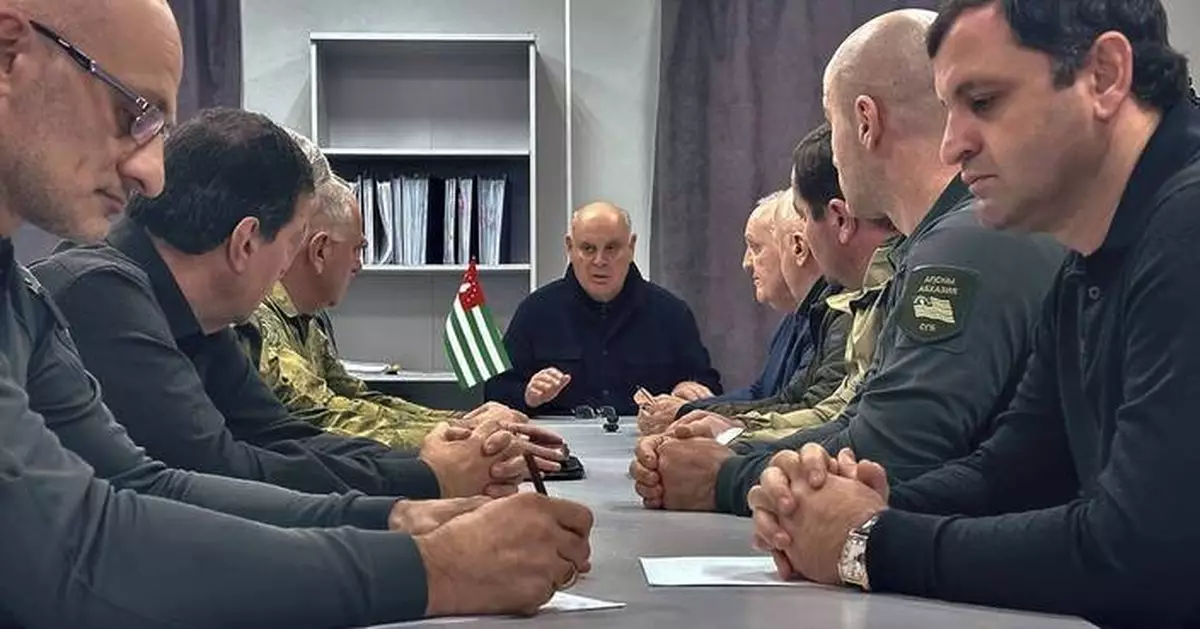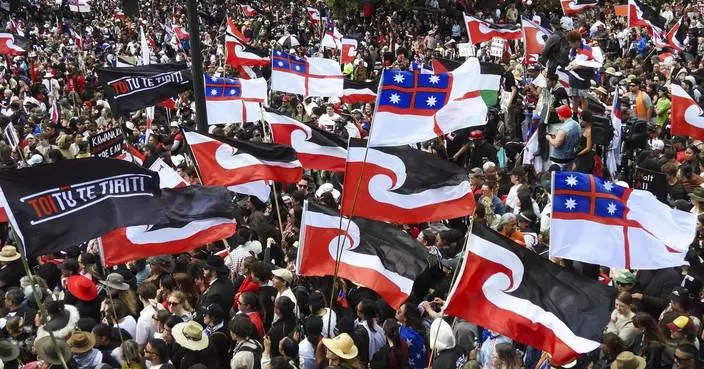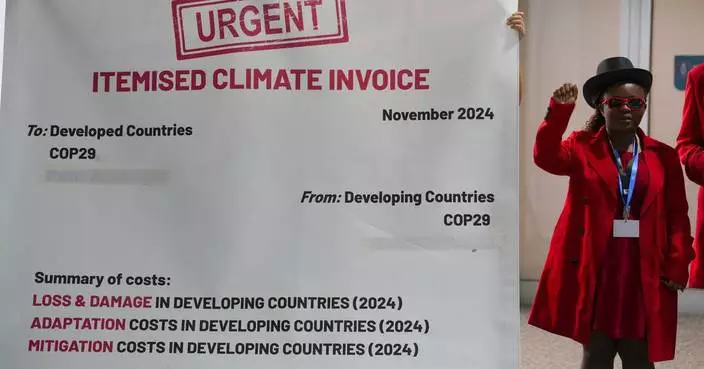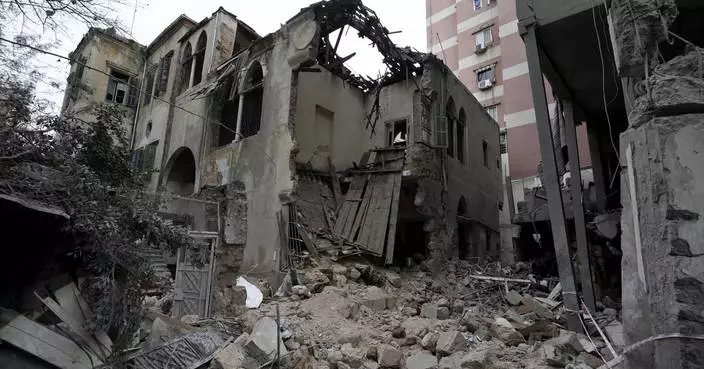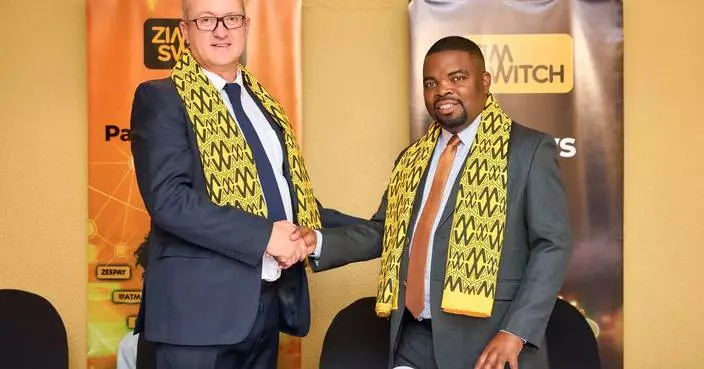TBILISI, Georgia (AP) — Opposition protesters in Georgia’s breakaway province of Abkhazia and its separatist government appeared to have reached an agreement on Tuesday to end days of unrest in which key government buildings were seized by demonstrators and at least 14 people were injured in clashes with police.
Demonstrators stormed the buildings on Friday to protest new measures allowing Russians to buy property in the seaside region, and demanded the ouster of self-styled Abkhazian President Aslan Bzhania. Bzhania said he was prepared to resign if the protesters cede control of the buildings, but the opposition refused to do so until he stepped down.
Russian state news outlet Sputnik reported early Tuesday that Bzhania, who is backed by Russia, submitted his resignation and the opposition agreed to leave the occupied buildings. Sputnik quoted Abkhazian Vice President Badra Gunba as saying that the agreement was reached after more than nine hours of negotiations.
Bzhania's resignation — which he promised to walk back if the protesters don't cede control of government buildings — has to be approved by Abkhazia's parliament, and Gunba would become acting president, Spuntik reported.
Most of Abkhazia broke away from Georgia in fighting that ended in 1993, and Georgia lost control of the rest of the territory in a short war with Russia in 2008. Russia recognizes Abkhazia as an independent country, but many Abkhazians are concerned that the region of about 245,000 people is a client state of Moscow.
Abkhazia’s mountains and Black Sea beaches make it a popular destination for Russian tourists and the demand for holiday homes could be strong.
At least 14 people were injured Friday when opposition protesters clashed with police, Russian state agencies reported.
Lawmakers had gathered at the region’s parliament building to discuss ratifying measures allowing Russian citizens to buy property in the breakaway state. However, the session was postponed as demonstrators broke down the gate to the building’s grounds with a truck and streamed inside. Some threw rocks at police, who responded with tear gas.
The arrest of five opposition figures at a similar demonstration last week set off widespread protests the next day in which bridges leading to Sukhumi were blocked.
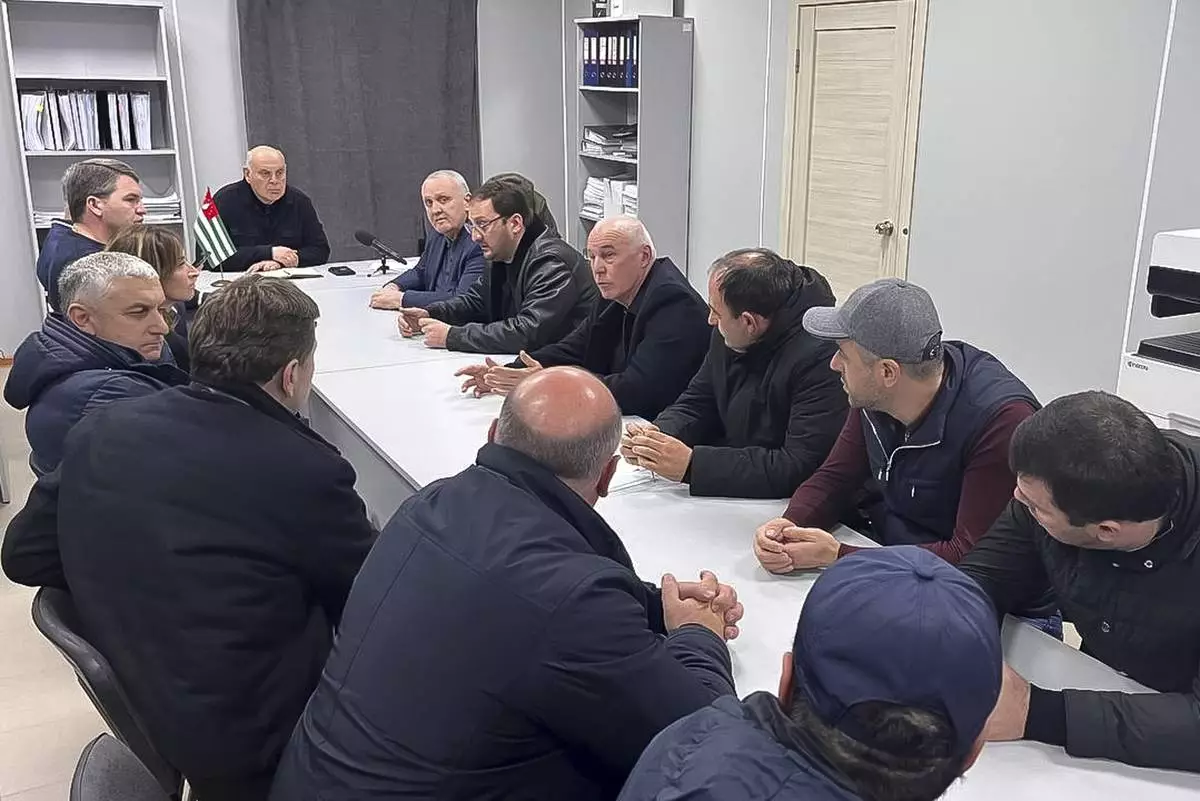
In this photo taken from video released by Information Center of the President of the Republic of Abkhazia on Monday, Nov. 18, 2024, Abkhazian President Aslan Bzhania, background second left, speaks to a group of Abkhazian lawmakers in the village of Tamishi, in Georgia’s breakaway province of Abkhazia. (Information Center of the President of the Republic of Abkhazia via AP)
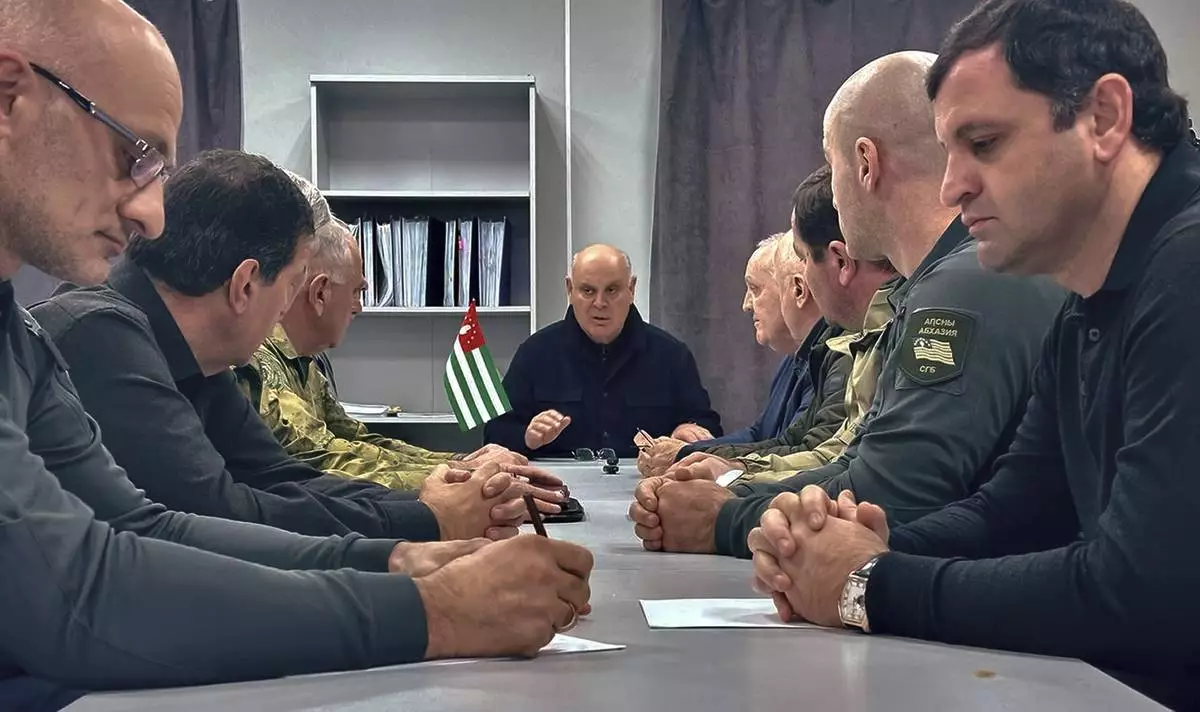
In this photo taken from video released by Information Center of the President of the Republic of Abkhazia on Monday, Nov. 18, 2024, Abkhazian President Aslan Bzhania, center, chairs a Security Council meeting in the village of Tamishi, in Georgia’s breakaway province of Abkhazia. (Information Center of the President of the Republic of Abkhazia via AP)
HONG KONG (AP) — Forty-five ex-lawmakers and activists were sentenced to four to 10 years in prison Tuesday in Hong Kong’s biggest national security case under a Beijing-imposed law that crushed a once-thriving pro-democracy movement.
They were prosecuted under the 2020 national security law for their roles in an unofficial primary election. Prosecutors said their aim was to paralyze Hong Kong’s government and force the city’s leader to resign by aiming to win a legislative majority and using it to block government budgets indiscriminately.
The unofficial primary held in July 2020 drew 610,000 voters, and its winners had been expected to advance to the official election. Authorities postponed the official legislative election, however, citing public health risks during the COVID-19 pandemic.
Legal scholar Benny Tai, whom the judges called the mastermind, received the longest sentence of 10 years. The judges said the sentences had been reduced for defendants who said they were unaware the plan was unlawful.
However, the court said the penalties were not reduced for Tai and former lawmaker Alvin Yeung because they are lawyers who were “absolutely adamant in pushing for the implementation of the Scheme.”
In the judgment posted online, the judges wrote that Tai essentially “advocated for a revolution” by publishing a series of articles over a period of months that traced his thinking, even though in a letter seeking a shorter sentence Tai said the steps were “never intended to be used as blueprint for any political action.”
Two of the 47 original defendants were acquitted earlier this year. The rest either pleaded guilty or were found guilty of conspiracy to commit subversion. The judges said in their verdict that the activists’ plans to effect change through the unofficial primary would have undermined the government’s authority and created a constitutional crisis.
The judges rejected the reasoning from some defendants that the scheme would never have materialized, stating that “all the participants had put in every endeavor to make it a success."
The judges highlighted that a great deal of time, resources and money were devoted to the organization of the primary election.
“When the Primary Election took place on the 10 and 11 July, no one had remotely mentioned the fact that Primary Election was no more than an academic exercise and that the Scheme was absolutely unattainable,” the judgment read. “In order to succeed, the organizers and participants might have hurdles to overcome, that however was expected in every subversion case where efforts were made to overthrow or paralyze a government.”
Some of the defendants waved at their relatives in the courtroom after they were sentenced.
Gwyneth Ho, a journalist-turned-activist who was jailed for seven years, said “our true crime for Beijing is that we were not content with playing along in manipulated elections” on her Facebook page.
“We dared to confront the regime with the question: Will democracy ever be possible within such a structure? The answer was a complete crackdown on all fronts of society," she wrote.
Chan Po-ying, wife of defendant Leung Kwok-hung, told reporters she wasn’t shocked when she learned her husband received a jail term of six years and nine months. She said they were trying to use some of the rights granted by the city’s mini-constitution to pressure those who are in power to address the will of the people.
“This is an unjust imprisonment. They shouldn’t be kept in jail for one day,” said Chan, also the chair of the League of Social Democrats, one of the city’s remaining pro-democracy parties.
Emilia Wong, the girlfriend of Ventus Lau, said his jail term was within her expectations. She said the sentencing was a “middle phase” of history and she could not see the end point at this moment, but she pledged to support Lau as best as she could.
Philip Bowring, the husband of Claudia Mo, was relieved that the sentences were finally handed down.
Observers said the trial illustrated how authorities suppressed dissent following huge anti-government protests in 2019, alongside media crackdowns and reduced public choice in elections. The drastic changes reflect how Beijing’s promise to retain the former British colony’s civil liberties for 50 years when it returned to China in 1997 is increasingly threadbare, they said.
Beijing and Hong Kong governments insisted the national security law was necessary for the city's stability.
The sentencing drew criticism from foreign governments and human rights organizations.
The U.S. Consulate in Hong Kong said the U.S. strongly condemned the sentences for the 45 pro-democracy advocates and former lawmakers.
“The defendants were aggressively prosecuted and jailed for peacefully participating in normal political activity protected under Hong Kong’s Basic Law,” the statement said, referring to the city's mini-constitution.
In Beijing, Chinese Foreign Ministry spokesperson Lin Jian told reporters no one should be allowed to use democracy as a pretext to engage in unlawful activities and escape justice.
Hong Kong Secretary for Security Chris Tang said in a news briefing that the sentences showed those committing national security crimes must be severely punished.
The subversion case involved pro-democracy activists across the spectrum. They include Tai, former student leader Joshua Wong and former lawmakers. Wong was sentenced to four years and eight months in jail. Young activist Owen Chow was given the second-longest jail term, seven years and nine months.
Most of them have already been detained for more than three and a half years before the sentencing. The separations pained them and their families.
More than 200 people stood in line in rain and winds Tuesday morning for a seat in the court, including one of the acquitted defendants, Lee Yue-shun. Lee said he hoped members of the public would show they care about the court case.
“The public's interpretation and understanding has a far-reaching impact on our society's future development,” he said.
Wei Siu-lik, a friend of convicted activist Clarisse Yeung, said she arrived at 4 a.m. even though her leg was injured. “I wanted to let them know there are still many coming here for them,” she said.
Thirty-one of the activists entered guilty pleas and had better chances of getting reduced sentences. The law authorizes a range of sentences depending on the seriousness of the offense and the defendant’s role in it, from under three years for the least serious to 10 years to life for people convicted of “grave” offenses.
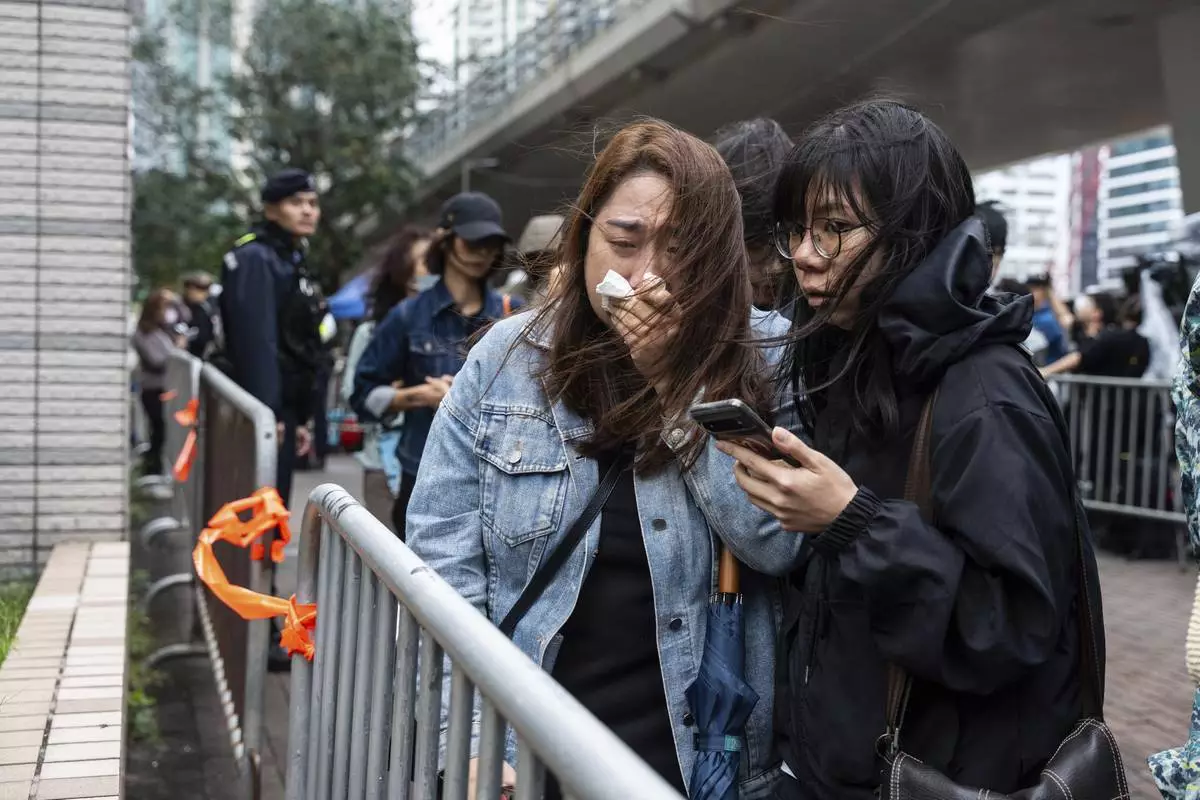
People leave the West Kowloon Magistrates' Courts in Hong Kong Tuesday, Nov. 19, 2024, following the sentencing in national security case. (AP Photo/Chan Long Hei)
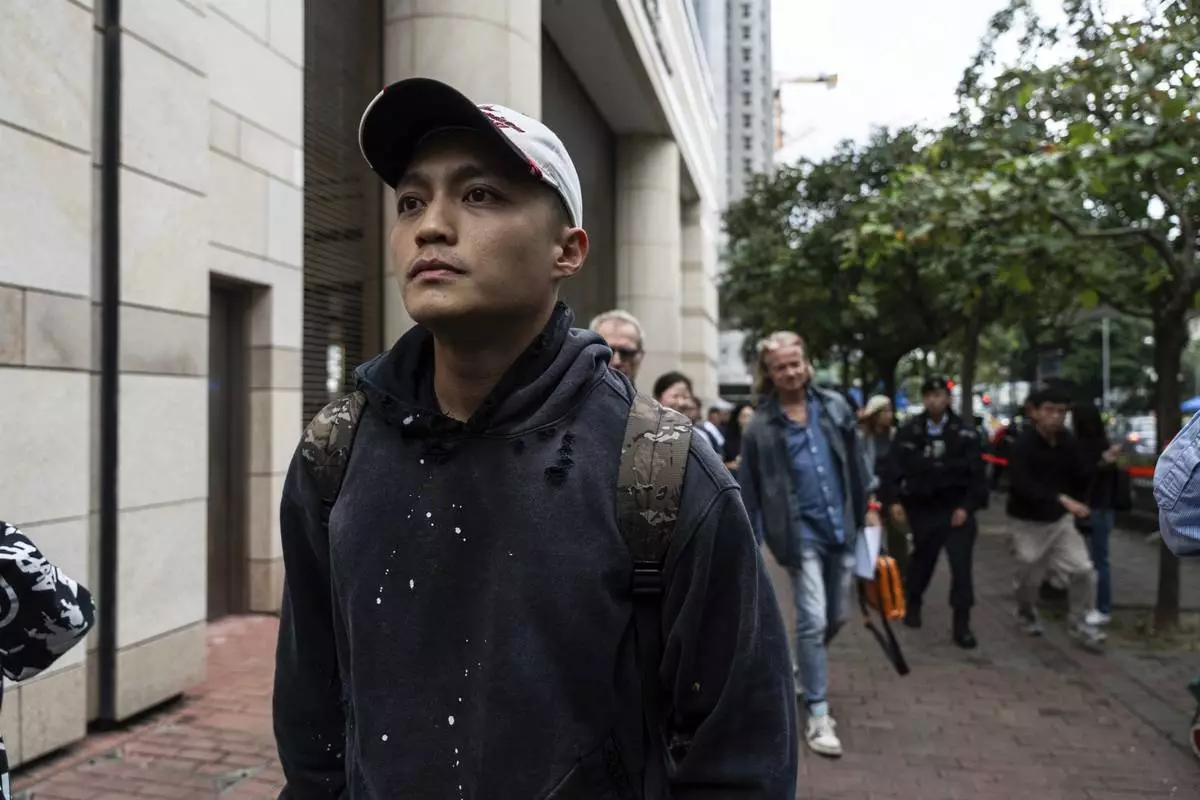
Lee Yue-shun, former pro-democracy district councilor who was cleared of the charge of the national security case, leaves the West Kowloon Magistrates' Courts in Hong Kong Tuesday, Nov. 19, 2024, following the sentencing in national security case. (AP Photo/Chan Long Hei)
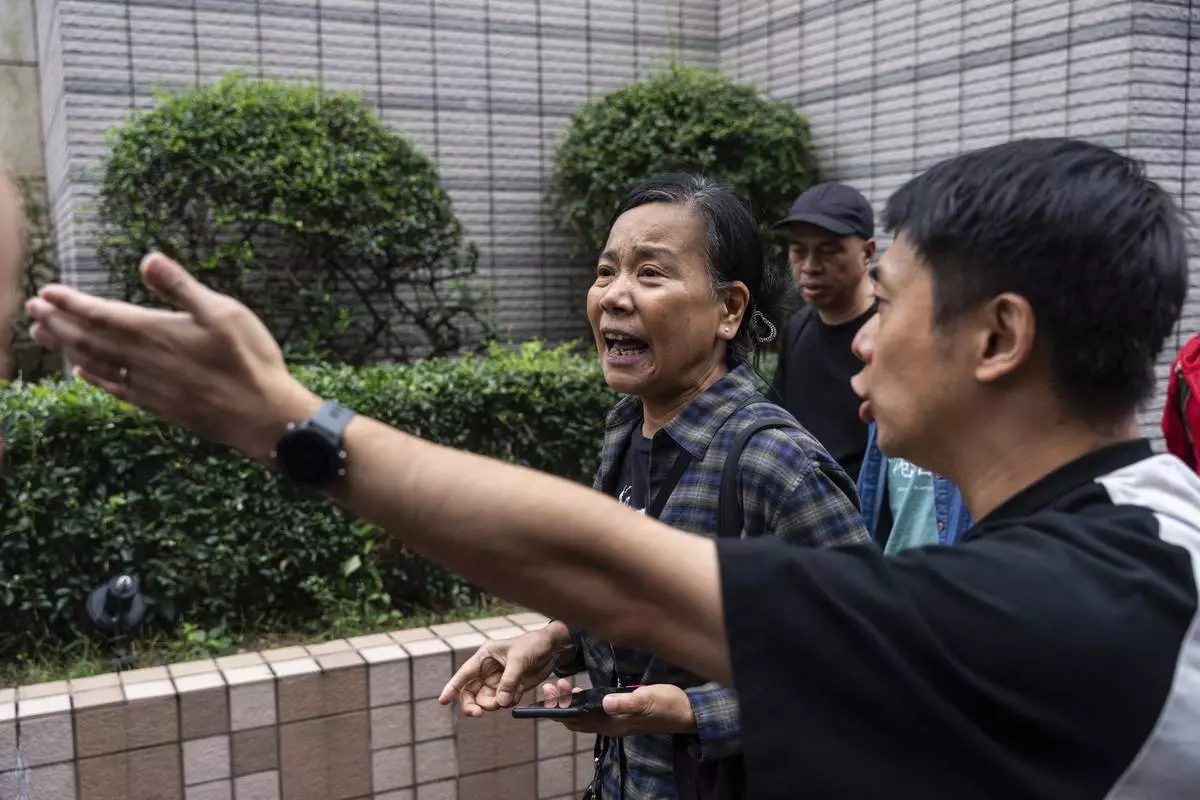
Chan Po-ying, wife of Leung Kwok-hung, one of the defendants in the national security case, leaves the West Kowloon Magistrates' Courts in Hong Kong Tuesday, Nov. 19, 2024, after the sentencing. (AP Photo/Chan Long Hei)
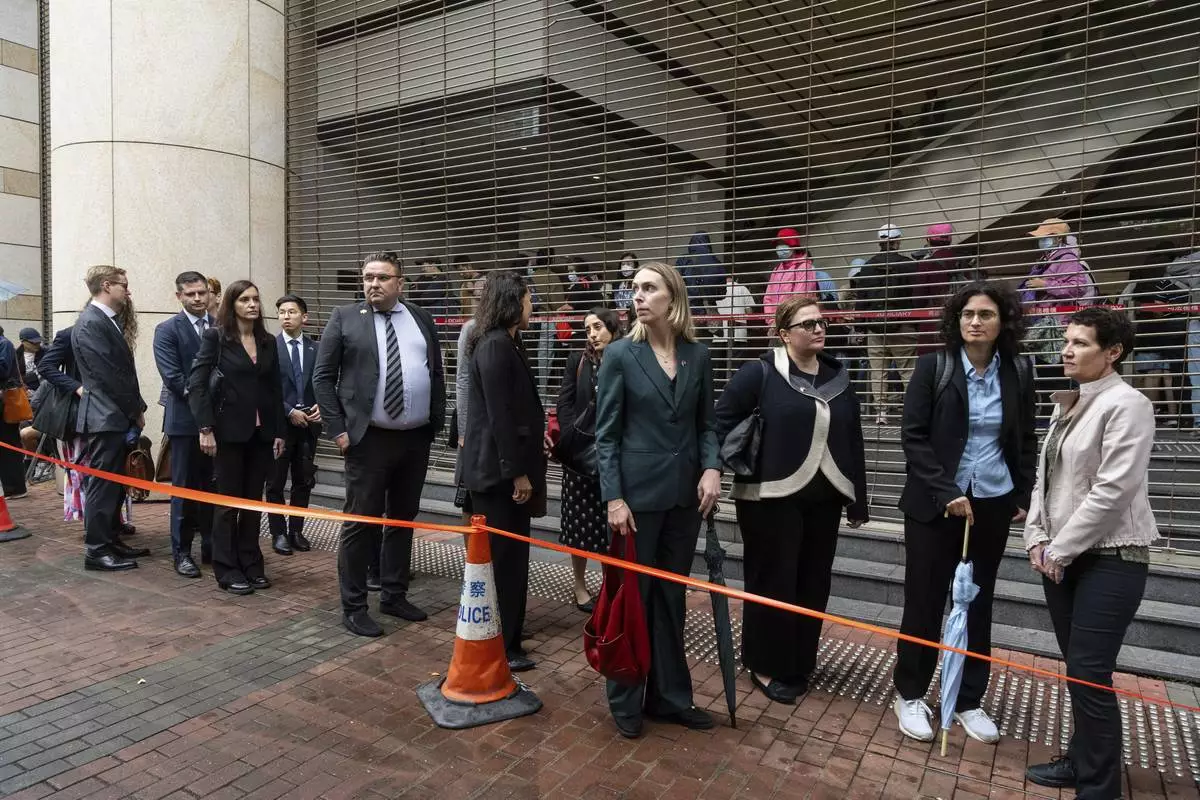
Representatives from various consulates wait in line outside the West Kowloon Magistrates' Courts in Hong Kong Tuesday, Nov. 19, 2024, ahead of the sentencing in national security case. (AP Photo/Chan Long Hei)
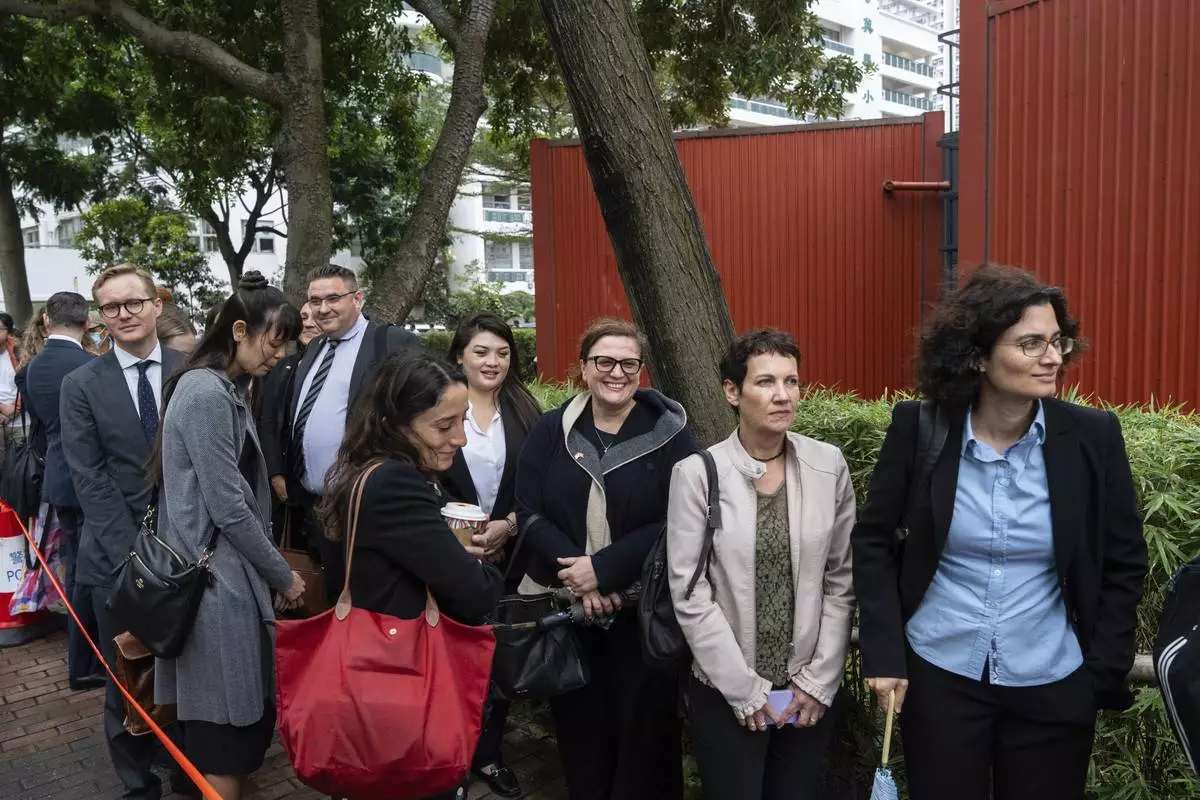
Representatives from various consulates wait in line outside the West Kowloon Magistrates' Courts in Hong Kong Tuesday, Nov. 19, 2024, ahead of the sentencing in national security case. (AP Photo/Chan Long Hei)
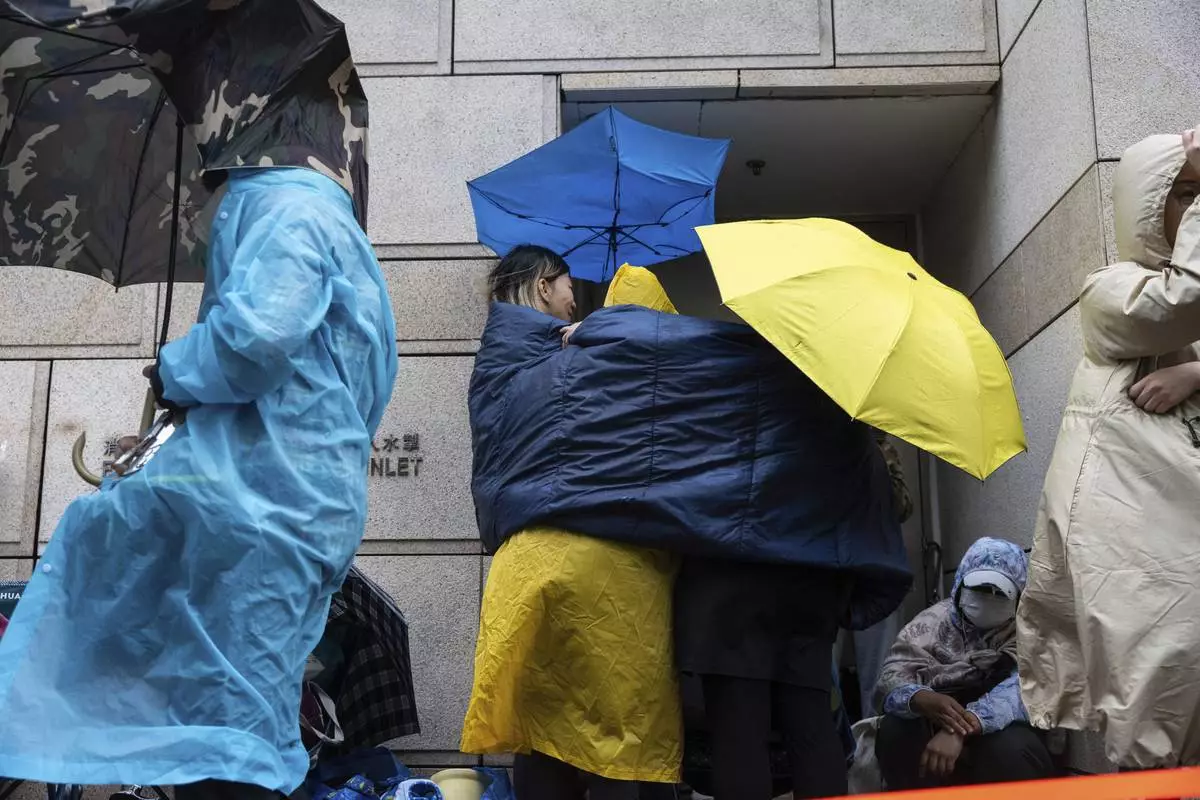
People wait outside the West Kowloon Magistrates' Courts in Hong Kong Tuesday, Nov. 19, 2024, ahead of the sentencing in national security case. (AP Photo/Chan Long Hei)
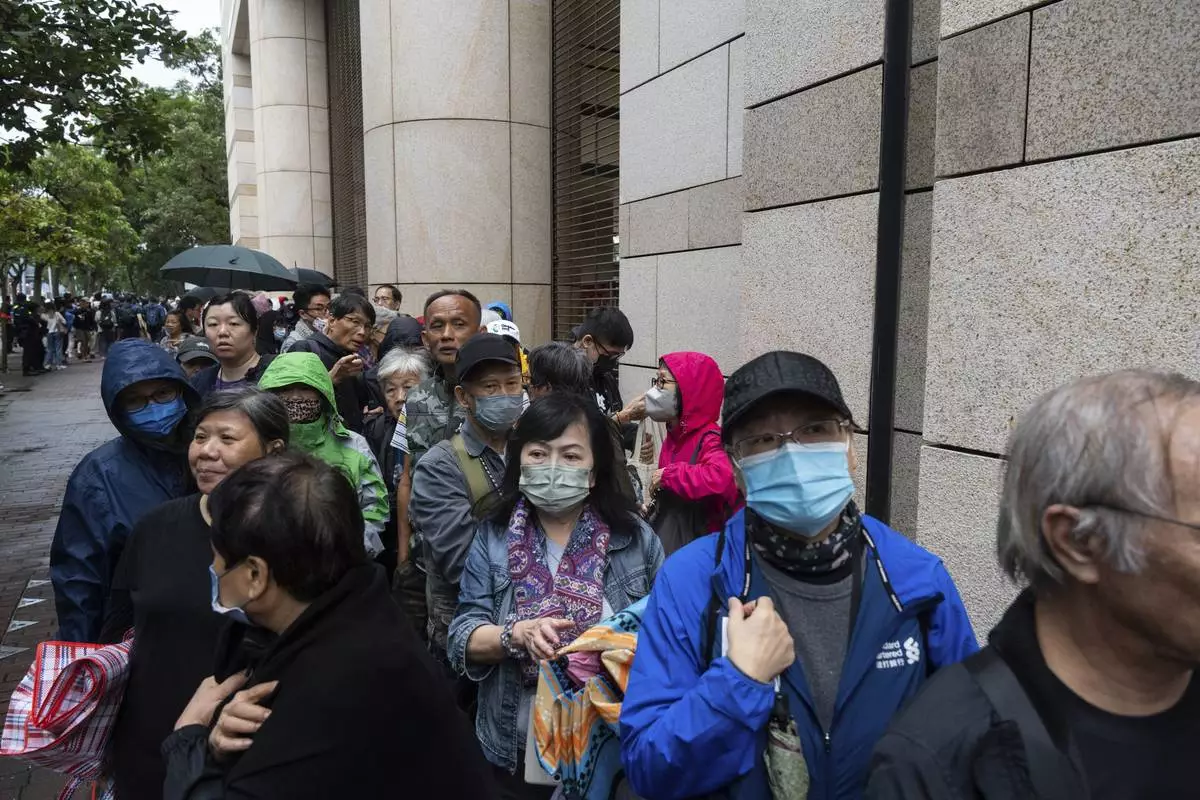
People wait outside the West Kowloon Magistrates' Courts in Hong Kong Tuesday, Nov. 19, 2024, ahead of the sentencing in national security case. (AP Photo/Chan Long Hei)
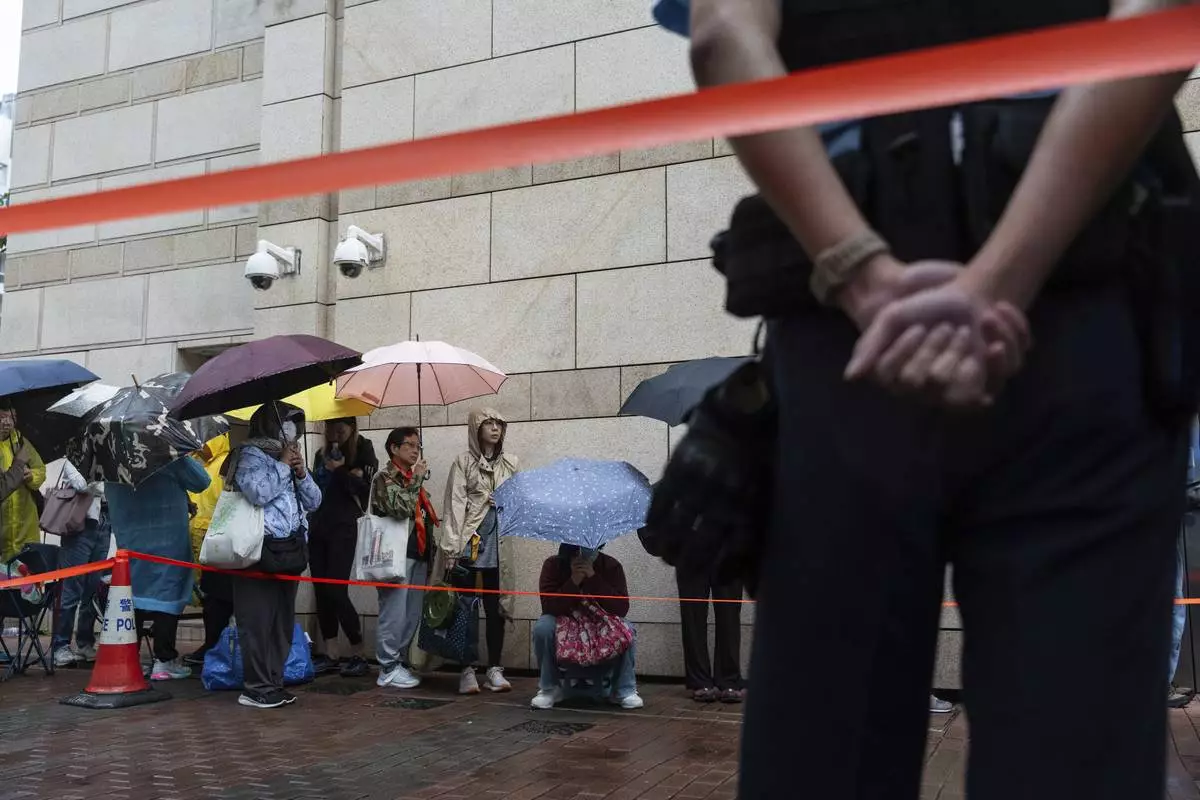
People wait outside the West Kowloon Magistrates' Courts in Hong Kong Tuesday, Nov. 19, 2024, ahead of the sentencing in national security case. (AP Photo/Chan Long Hei)
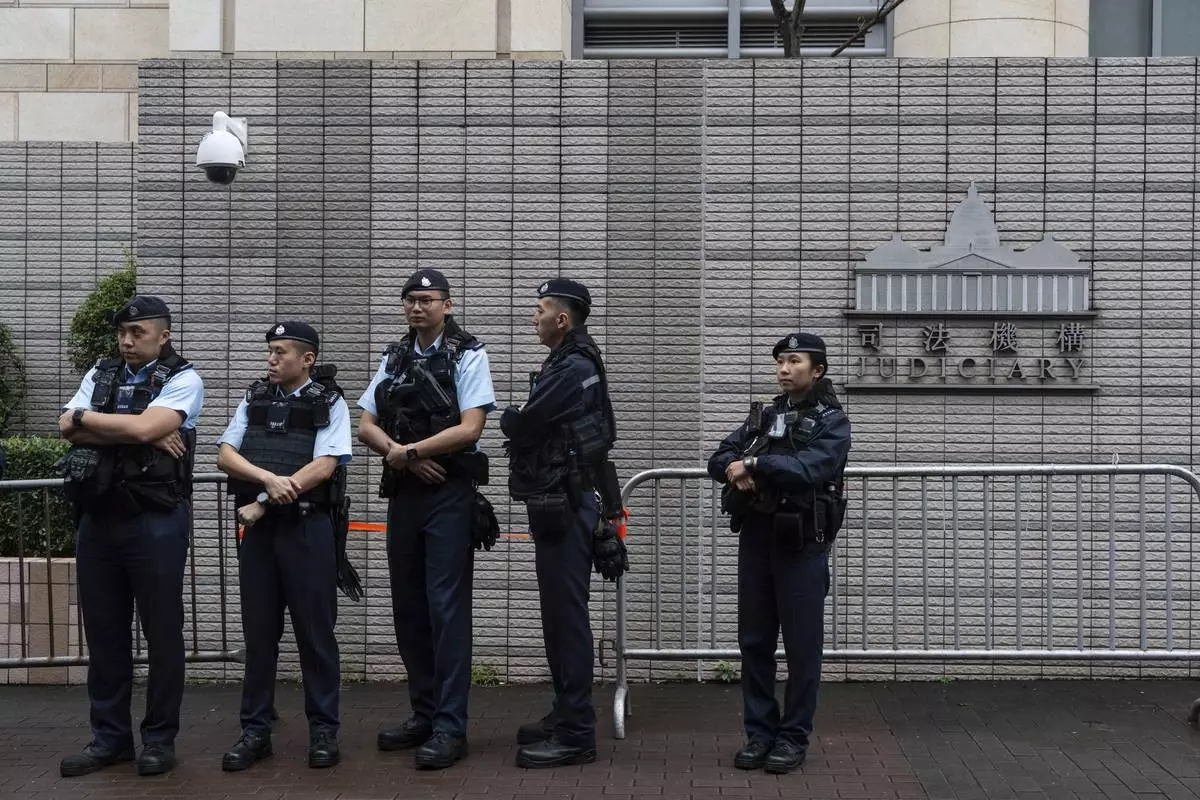
Police officers stand guard outside the West Kowloon Magistrates' Courts in Hong Kong Tuesday, Nov. 19, 2024. (AP Photo/Chan Long Hei)
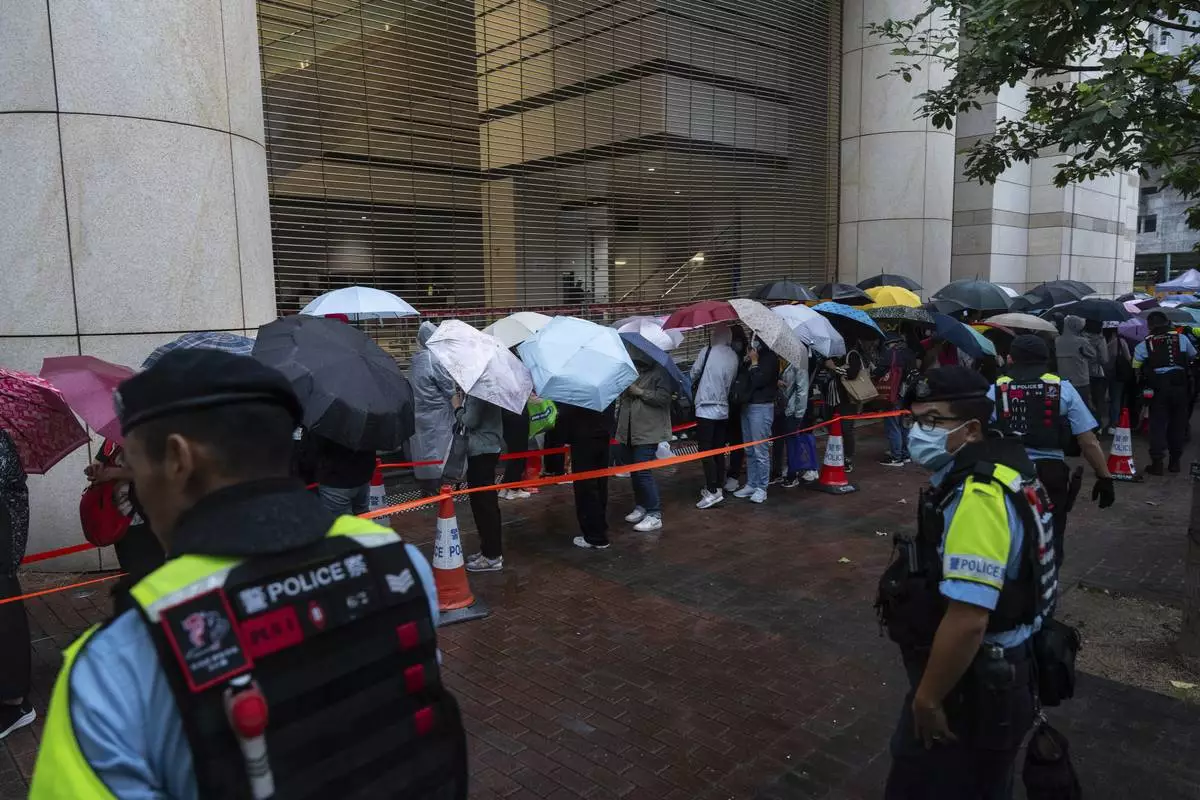
People wait outside the West Kowloon Magistrates' Courts in Hong Kong Tuesday, Nov. 19, 2024, ahead of the sentencing in national security case. (AP Photo/Chan Long Hei)
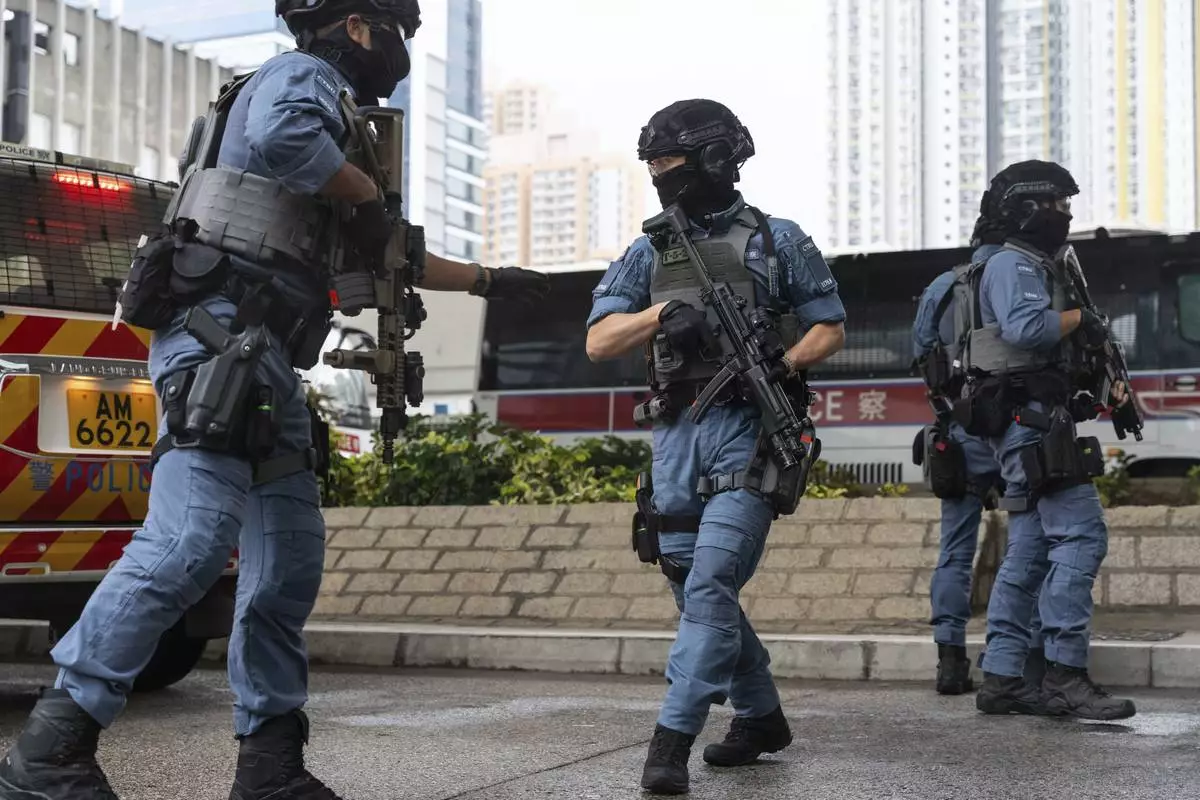
Armed police officers stand guard outside the West Kowloon Magistrates' Courts in Hong Kong Tuesday, Nov. 19, 2024. (AP Photo/Chan Long Hei)
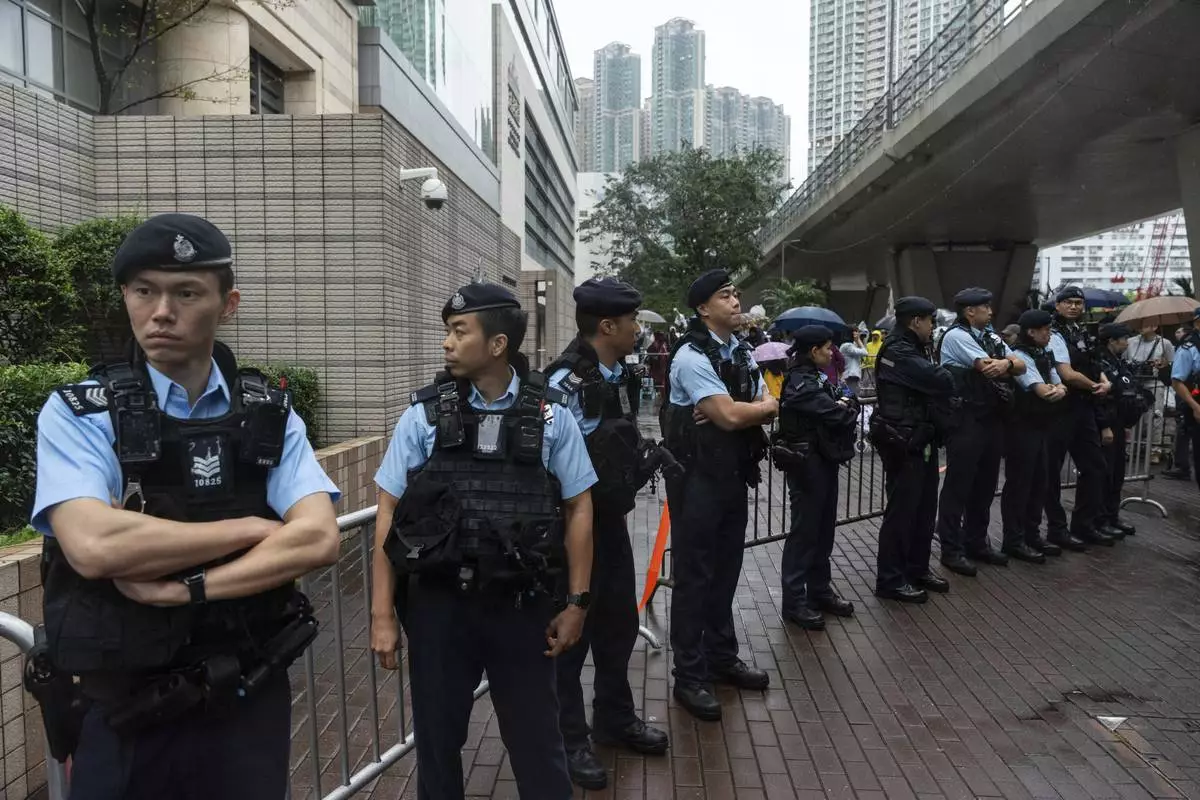
Police officers stand guard outside the West Kowloon Magistrates' Courts in Hong Kong, Tuesday, Nov. 19, 2024. (AP Photo/Chan Long Hei)
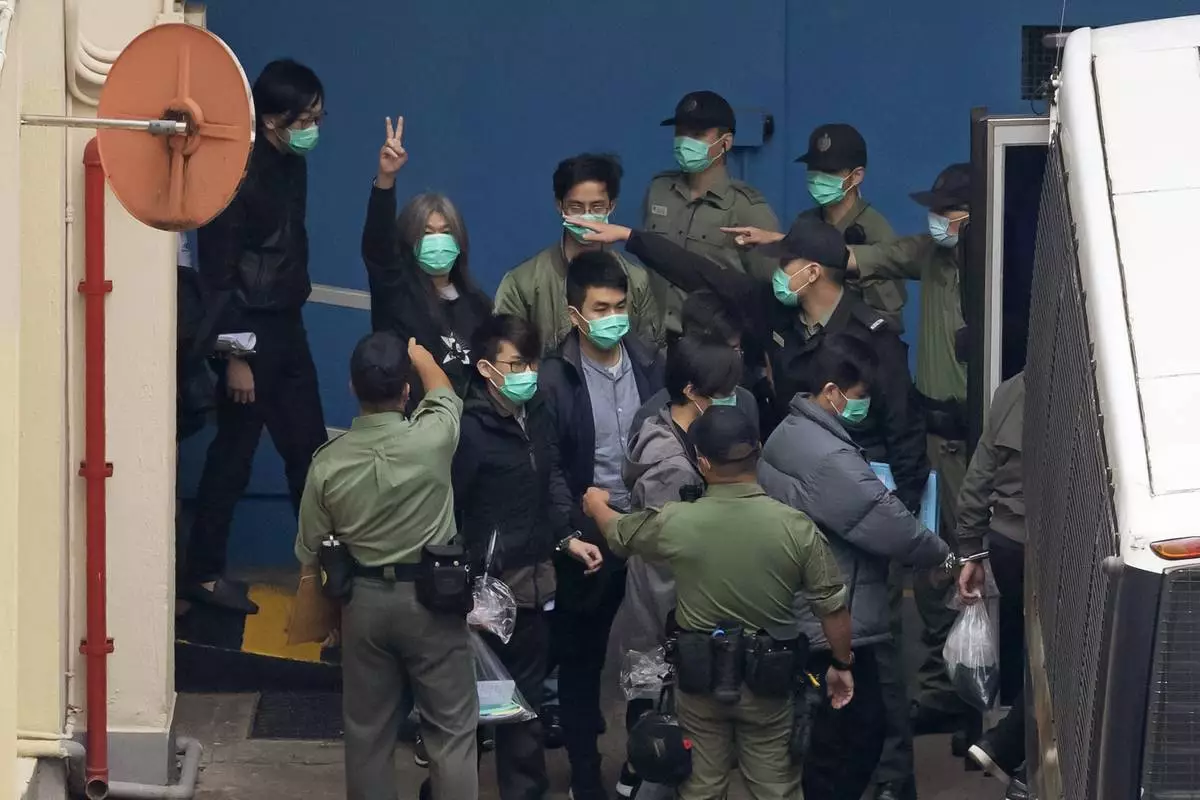
FILE - Former lawmaker Leung Kwok-hung, known as "Long Hair," second left, shows a victory sign as some of the 47 pro-democracy activists are escorted by Correctional Services officers to a prison van in Hong Kong, March 4, 2021. (AP Photo/Kin Cheung, File)
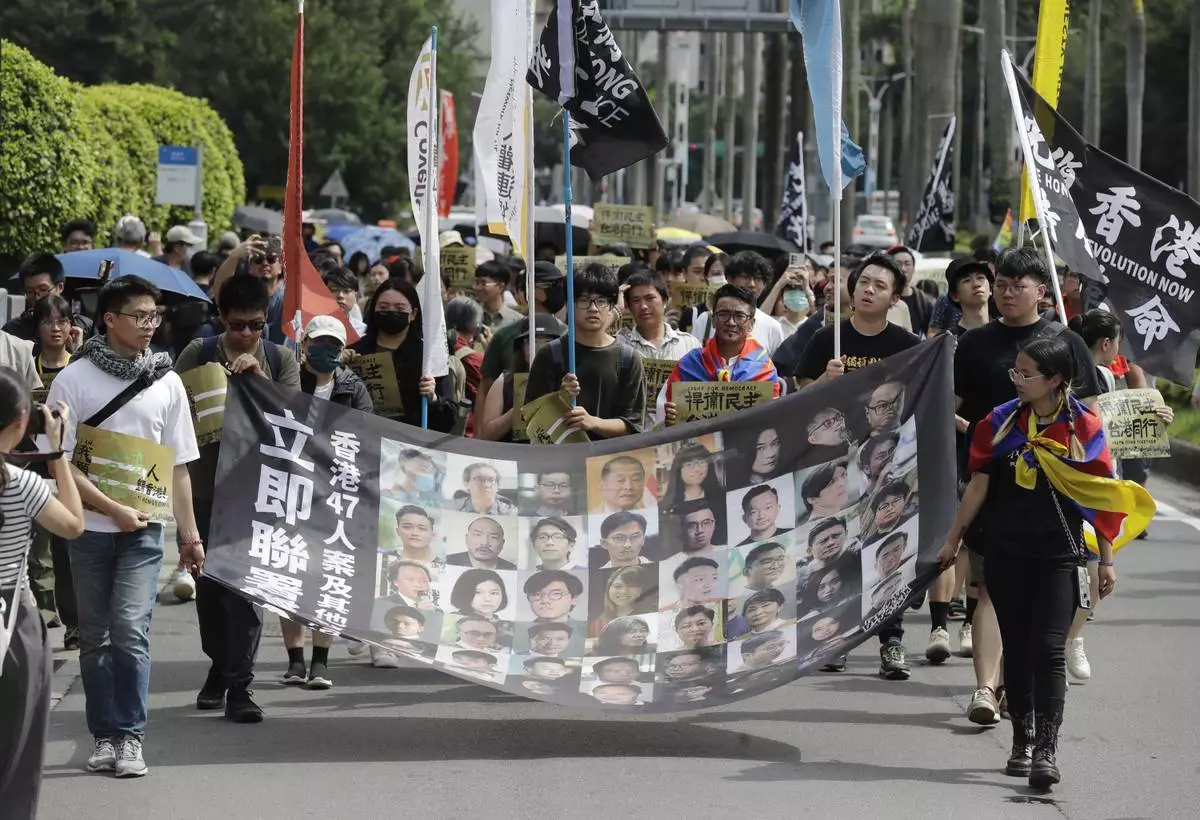
FILE- Hong Kong activists and supporters march with a banner which reads " Unite now in solidarity with the Hong Kong 47 and other political prisoners" during a protest commemorating the 10th anniversary of the 2014 umbrella movement and the fifth anniversary of the anti-extradition law amendment bill movement in Taipei, Taiwan, June 9, 2024. (AP Photo/Chiang Ying-ying, File)
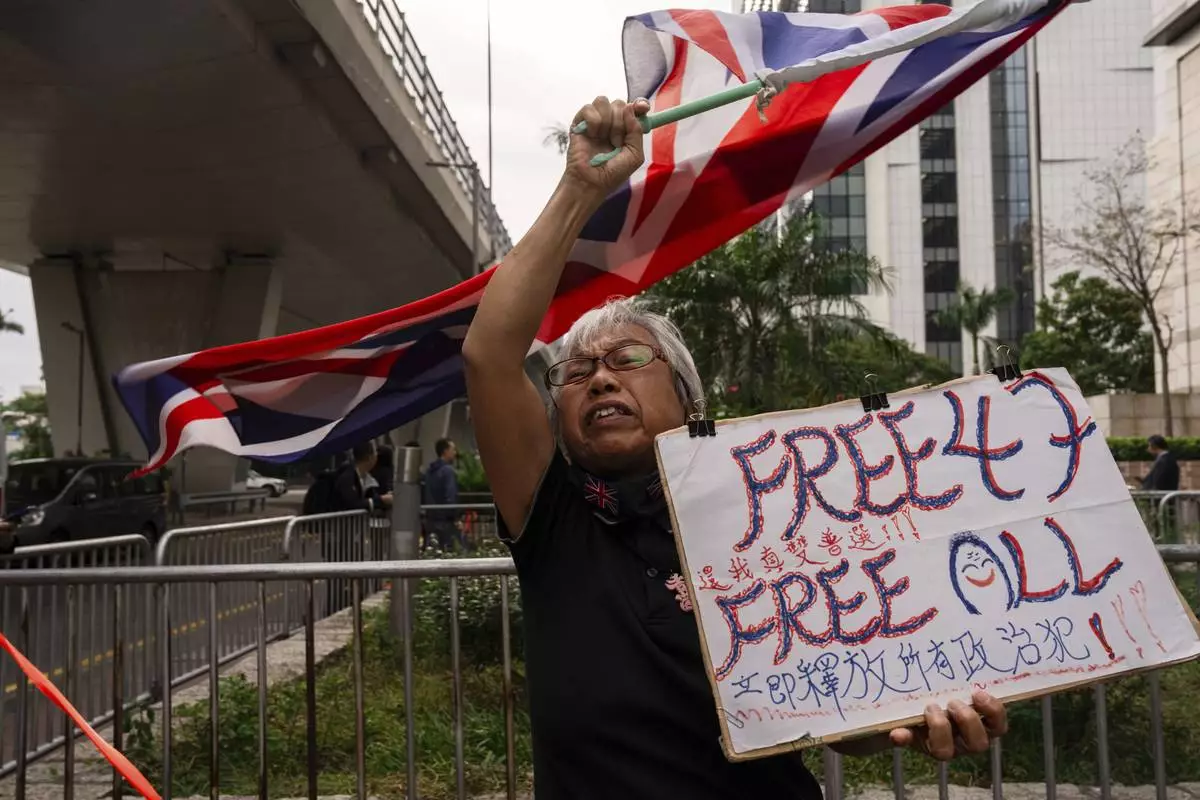
FILE- A pro-democracy activist known as "Grandma Wong" protests outside the West Kowloon courts in a cordoned off area set up by police as closing arguments open in Hong Kong's largest national security trial of 47 pro-democracy figures in Hong Kong, Nov. 29, 2023. (AP Photo/Louise Delmotte, File)
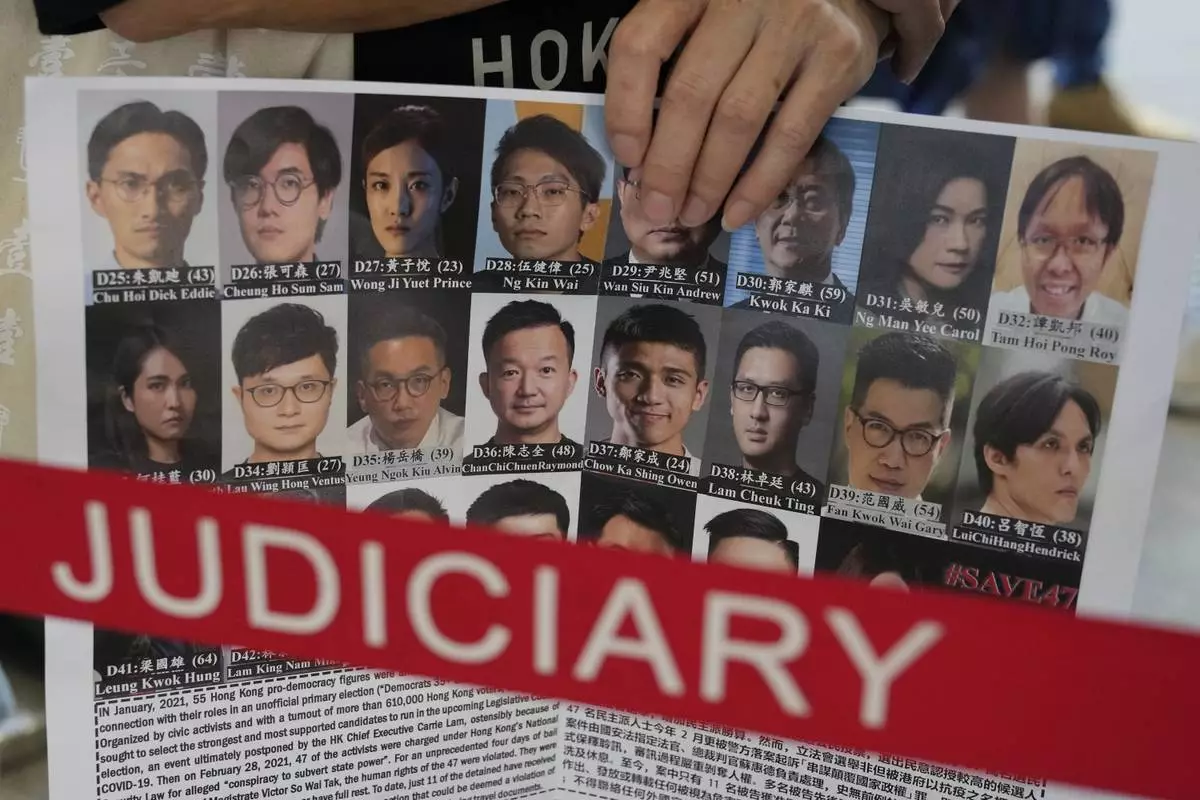
FILE - A supporter holds a placard with the photos of some of the 47 pro-democracy defendants outside a court in Hong Kong, on July 8, 2021. (AP Photo/Kin Cheung, File)
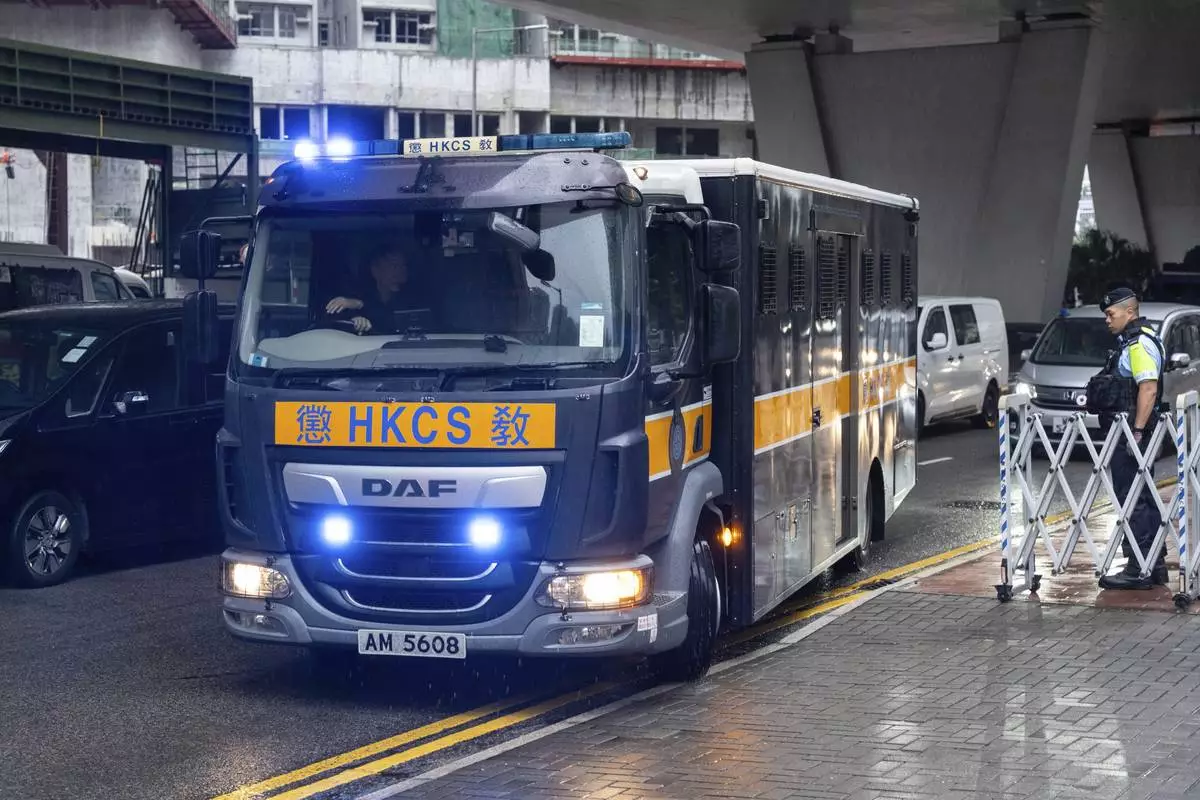
A Correctional Services Department vehicle arrives at the West Kowloon Magistrates' Courts in Hong Kong Tuesday, Nov. 19, 2024, ahead of the sentencing in national security case. (AP Photo/Chan Long Hei)
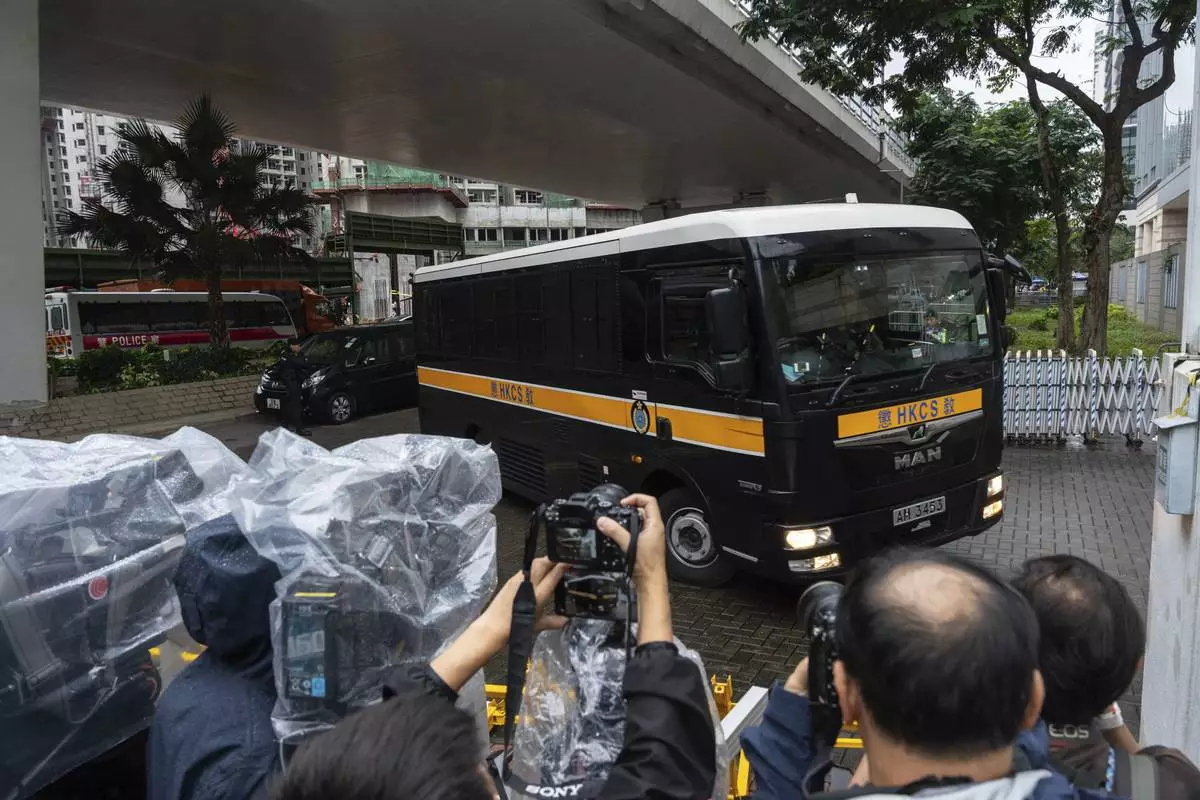
A Correctional Services Department vehicle arrives at the West Kowloon Magistrates' Courts in Hong Kong Tuesday, Nov. 19, 2024, ahead of the sentencing in national security case. (AP Photo/Chan Long Hei)
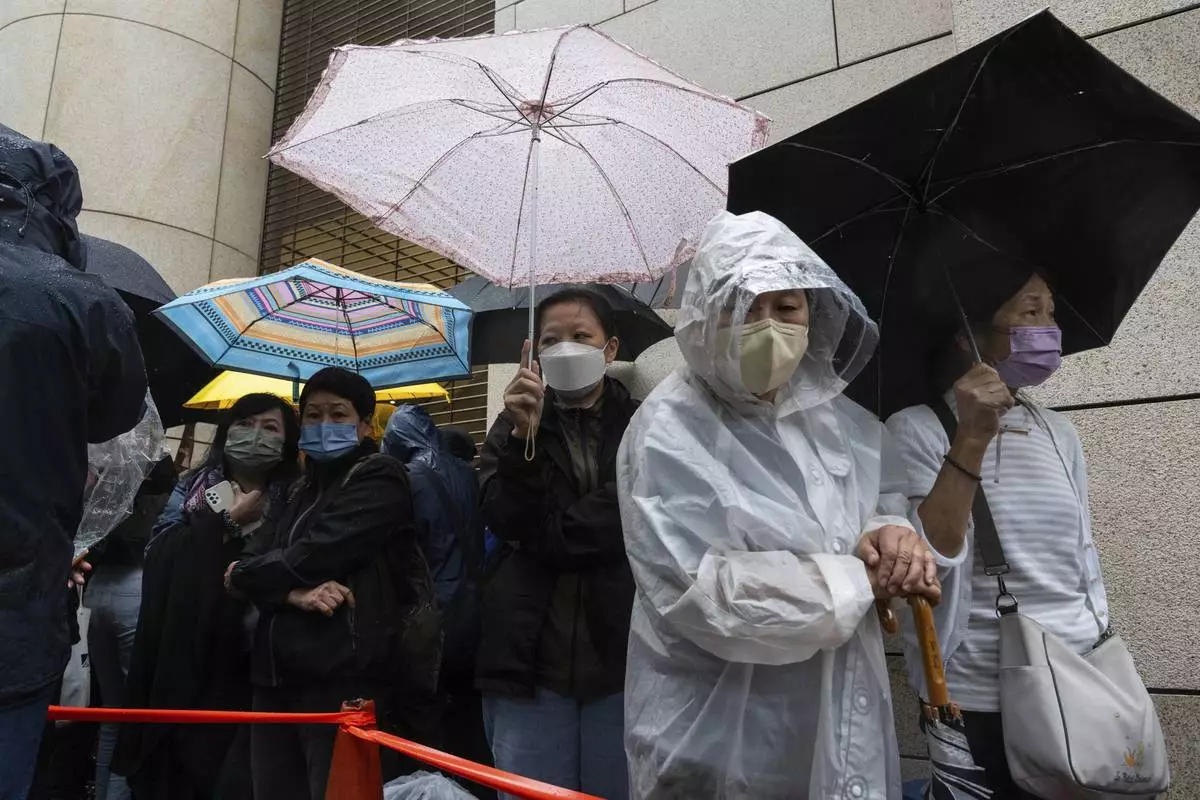
People wait outside the West Kowloon Magistrates' Courts in Hong Kong Tuesday, Nov. 19, 2024, ahead of the sentencing in national security case. (AP Photo/Chan Long Hei)
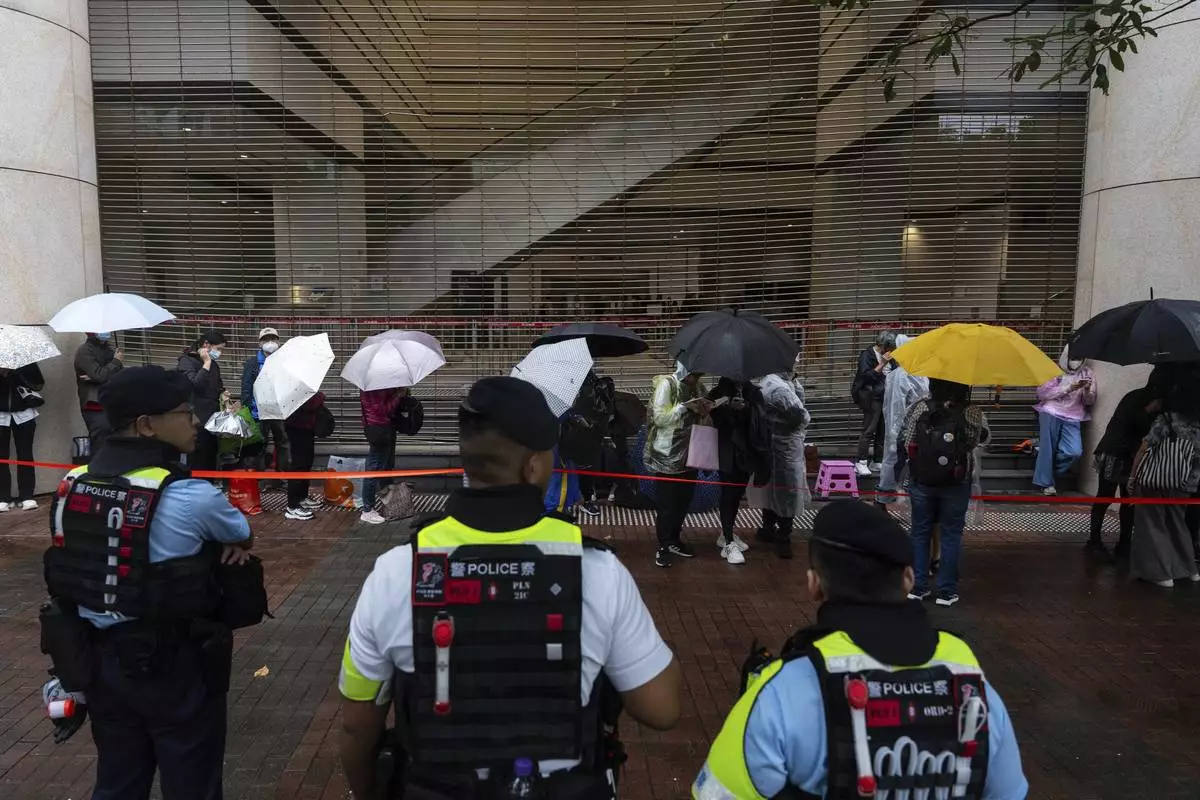
People wait outside the West Kowloon Magistrates' Courts in Hong Kong Tuesday, Nov. 19, 2024, ahead of the sentencing in national security case. (AP Photo/Chan Long Hei)




